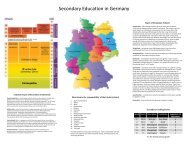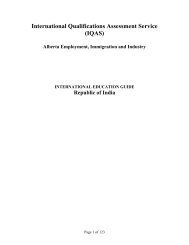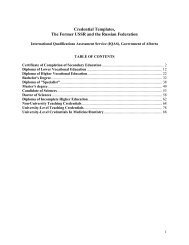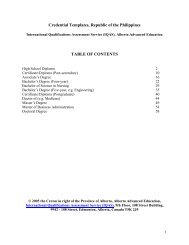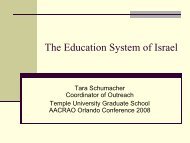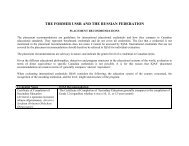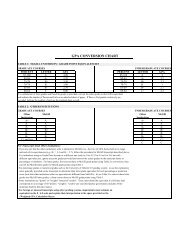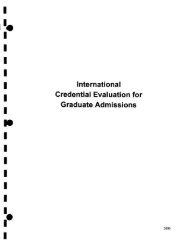- Page 1 and 2:
NARIC guid
- Page 3 and 4:
Austria
- Page 5 and 6:
Glossary Bundesgesetz Federal act.
- Page 7 and 8:
Introduction In 1993, the new Austr
- Page 9 and 10:
The Academy of Fine Arts in Vienna
- Page 11 and 12:
Examples of some study programmes (
- Page 13 and 14:
In the schools of art and music, do
- Page 15 and 16:
II. Qualifications and diplomas II.
- Page 17 and 18:
The special qualification for schoo
- Page 19 and 20:
Appendix I General university quali
- Page 21 and 22:
Dipl.-Ing. für industrielle Elektr
- Page 23 and 24:
Appendix IV Curricula charts The fo
- Page 25 and 26:
Chart 2 Veterinärmedizinischen Uni
- Page 27 and 28:
Belgium (French-speaking Community)
- Page 29 and 30:
II.3. Final qualifications in highe
- Page 31 and 32:
NB: The distinction between the two
- Page 33 and 34:
Legislative body on matters of gran
- Page 35 and 36:
University education is intended to
- Page 37 and 38:
I.3. Organisation of studies I.3.1.
- Page 39 and 40:
There are two examination sessions:
- Page 41 and 42:
(ii) qualification indicating abili
- Page 43 and 44:
Candidat(e) (2): en psychologie et
- Page 45 and 46:
From a strictly academic point of v
- Page 47 and 48:
Diplomas awarded at the end of cour
- Page 49 and 50:
After successfully completing the f
- Page 51 and 52:
Diagram of the higher education sys
- Page 53 and 54:
esthétique industrielle (industria
- Page 55 and 56:
Higher education in economics Ingé
- Page 57 and 58:
lettres (romanes...) (the arts (Rom
- Page 59 and 60:
For all the abovementioned courses
- Page 61 and 62:
Lectures left to the choice of the
- Page 63 and 64:
Candidates for higher education who
- Page 65 and 66:
Belgium (Flemish Community)
- Page 67 and 68:
IV. SPECIAL TYPES AND FORMS OF QUAL
- Page 69 and 70:
Glossary Geaggregeerde voor het lag
- Page 71 and 72:
II. Higher education in the Flemish
- Page 73 and 74:
16. dentistry 17. veterinary scienc
- Page 75 and 76:
II.3. Organisation of courses of st
- Page 77 and 78:
The student is examined in each sub
- Page 79 and 80:
Individual universities can decide
- Page 81 and 82:
Kandidaat: burgerlijk ingenieur bur
- Page 83 and 84:
(b) the specialisation courses are
- Page 85 and 86:
This is a form of higher education
- Page 87 and 88:
Appendix 1. Final degrees — hoges
- Page 89 and 90:
industrieel ingenieur in landbouw e
- Page 91 and 92:
Wetenschappen motorische revalidati
- Page 93 and 94:
Denmark
- Page 95 and 96:
Abbreviations AAA Arkitektskolen i
- Page 97 and 98:
College of nutrition and home econo
- Page 99 and 100:
Kunstakademi Academy of fine arts.
- Page 101 and 102:
Speciale Thesis. The candidatus deg
- Page 103 and 104:
The multifaculty universities are t
- Page 105 and 106:
I.2. Number of students 1992/93 Tot
- Page 107 and 108:
Marks and examinations Generally, m
- Page 109 and 110:
The higher commercial examination c
- Page 111 and 112:
It is possible to change to courses
- Page 113 and 114:
Before 1988, the name of the PhD de
- Page 115 and 116:
III. Special types and forms of fin
- Page 117 and 118:
IV. Recognition of foreign degrees
- Page 119 and 120:
Bibliography Publications in Englis
- Page 121 and 122:
Appendix II Danish non-university h
- Page 123 and 124:
Økonomaskolen The Danish School of
- Page 125 and 126:
Cand.tech.al. Candidatus(a) technic
- Page 127 and 128:
Second main subject chosen freely f
- Page 129 and 130:
Cand.scient. study programmes The c
- Page 131 and 132:
Chartered accountants, sworn interp
- Page 133 and 134:
Finland
- Page 135 and 136:
Glossary Alempi korkeakoulututkinto
- Page 137 and 138:
I. Higher education system In Finla
- Page 139 and 140:
All these 20 universities undertake
- Page 141 and 142:
At the end of 1995 the total number
- Page 143 and 144:
Non-university higher education In
- Page 145 and 146:
Each test in the new examination is
- Page 147 and 148:
New degrees — kandidaatti and mai
- Page 149 and 150:
The graduates can use two kinds of
- Page 151 and 152:
III. Special types and forms of qua
- Page 153 and 154:
Engineer second class (konemestari/
- Page 155 and 156:
Diagram of the education system in
- Page 157 and 158:
Appendix I List of qualifications i
- Page 159 and 160:
Teatteritaiteen kandidaatti/Kandida
- Page 161 and 162:
Old: until the end of July 1999 New
- Page 163 and 164:
Pharmacy Farmasian lisensiaatti/Far
- Page 165 and 166:
Appendix II Description of a degree
- Page 167 and 168:
Appendix III Description of a degre
- Page 169 and 170:
Appendix IV Description of a degree
- Page 171 and 172:
France
- Page 173 and 174:
II.3. Final degrees in higher educa
- Page 175 and 176:
Glossary Baccalauréat Secondary sc
- Page 177 and 178:
Lycées Lycées are secondary schoo
- Page 179 and 180:
to develop higher education in the
- Page 181 and 182:
There are eight other IEPs in the p
- Page 183 and 184:
the educational programmes: objecti
- Page 185 and 186:
I.2. Number of students In 1995/96,
- Page 187 and 188:
The organisation of the doctoral pr
- Page 189 and 190:
The baccalauréat examination The b
- Page 191 and 192:
II.2. Intermediate degrees in highe
- Page 193 and 194:
II.3.1. Final degrees in non-univer
- Page 195 and 196:
To receive the DUT, a student must
- Page 197 and 198:
Dentistry (requires five years of s
- Page 199 and 200:
Institutions of higher education ta
- Page 201 and 202:
Bibliography A. General publication
- Page 203 and 204:
Appendix I List of professions and
- Page 205 and 206:
Professions maritimes Capitaine de
- Page 207 and 208:
Contents Glossary 149 I. THE HIGHER
- Page 209 and 210:
Glossary Abendgymnasium General sec
- Page 211 and 212:
General education secondary school
- Page 213 and 214:
As universities for applied studies
- Page 215 and 216:
I.2.3. Classes and academic year Co
- Page 217 and 218:
II. Examinations and academic degre
- Page 219 and 220:
Grade scale The following grade sca
- Page 221 and 222:
The degree programme is divided int
- Page 223 and 224:
The individual advanced studies sub
- Page 225 and 226:
The advanced studies are concluded
- Page 227 and 228:
Stage II studies involve further co
- Page 229 and 230:
Training for this type of teaching
- Page 231 and 232:
According to an agreement by the St
- Page 233 and 234:
The degree programme in medicine in
- Page 235 and 236:
The examinee is presented with prac
- Page 237 and 238:
(c) On registration for the degree
- Page 239 and 240:
(c) The following courses are requi
- Page 241 and 242:
Licensing, doctoral degree, special
- Page 243 and 244:
An examination period is set for th
- Page 245 and 246:
During the placement period, it is
- Page 248 and 249:
Greece
- Page 250 and 251:
Abbreviations/glossary ADSEN Anoter
- Page 252 and 253:
I.1. The institutions of higher edu
- Page 254 and 255:
Some universities, as it can be ded
- Page 256 and 257:
Non-university higher education in
- Page 258 and 259:
The objective of the academy is to
- Page 260 and 261:
I.3. Organisation of course of stud
- Page 262 and 263:
Final examinations and examination
- Page 264 and 265:
Students complete part of the pract
- Page 266 and 267:
I.3.2. University higher education
- Page 268 and 269:
All students are taught the same su
- Page 270 and 271:
Candidates’ entry into higher edu
- Page 272 and 273: II.3.2. Final university qualificat
- Page 274 and 275: Diagram of the Greek educational sy
- Page 276 and 277: Iceland
- Page 278 and 279: III. SPECIAL TYPES AND FORMS OF FIN
- Page 280 and 281: Glossary BA/BS/BEd próf First univ
- Page 282 and 283: I. Higher education system Accordin
- Page 284 and 285: The non-university higher education
- Page 286 and 287: At the end of the 10th grade all pu
- Page 288 and 289: II.2. Intermediate qualifications i
- Page 290 and 291: The university higher education ins
- Page 292 and 293: Doktorspróf (doctorate degree) In
- Page 294 and 295: III. Special types and forms of fin
- Page 296 and 297: Diagram of the Icelandic education
- Page 298 and 299: Appendix I Final qualifications Non
- Page 300 and 301: Appendix II Final qualifications Un
- Page 302 and 303: Postgraduate studies: Mathematics +
- Page 304 and 305: Management Department (Rekstrardeil
- Page 306 and 307: Contents Abbreviations 528 Glossary
- Page 308 and 309: Glossary Ab initio Literally, ‘fr
- Page 310 and 311: Modular credit system An approach t
- Page 312 and 313: I. Higher education system Higher e
- Page 314 and 315: There are eight colleges of educati
- Page 316 and 317: Most courses are taught but many po
- Page 318 and 319: An undifferentiated Class II grade
- Page 320 and 321: the senior trade certificate of the
- Page 324 and 325: III. Special types and forms of fin
- Page 326 and 327: Bibliography Central applications o
- Page 328 and 329: Appendix I Samples of study program
- Page 330 and 331: foundations of public administratio
- Page 332 and 333: studies in the analysis of 20th-cen
- Page 334 and 335: Bachelor in Obstetrics (BAO) six ye
- Page 336 and 337: National University of Ireland Mast
- Page 338 and 339: Master of Science (MSc) Master of T
- Page 340 and 341: Contents Abbreviations 464 Glossary
- Page 342 and 343: Glossary Diploma di maturità The s
- Page 344 and 345: I. The higher education system In t
- Page 346 and 347: At present, there are two official
- Page 348 and 349: With reference to university autono
- Page 350 and 351: (c) Schools for midwives University
- Page 352 and 353: The curricula of a few CLs include
- Page 354 and 355: II. Qualifications and diplomas Non
- Page 356 and 357: The examinations are administered b
- Page 358 and 359: The said examination might therefor
- Page 360 and 361: (a) SS courses They are all subject
- Page 362 and 363: According to the old official regul
- Page 364 and 365: Only SDAFS undergraduates who have
- Page 366 and 367: The laurea is an exclusively academ
- Page 368 and 369: III. Special types and forms of fin
- Page 370 and 371: These two-year courses which, once
- Page 372:
Diagram of the Italian education sy
- Page 375 and 376:
Contents Abbreviations 640 Glossary
- Page 377 and 378:
Glossary Abitur Official certificat
- Page 379 and 380:
Internationale Akademie für Philos
- Page 381 and 382:
II. Qualifications and diplomas II.
- Page 383 and 384:
The degree Master of Philosophy (Ma
- Page 385 and 386:
Diagram of study programmes in Liec
- Page 387 and 388:
Contents Abbreviations 614 Glossary
- Page 389 and 390:
Glossary Certificat Generally used
- Page 391 and 392:
The one institution providing post-
- Page 393 and 394:
Each academic year at the CC is con
- Page 395 and 396:
II. Qualifications and diplomas The
- Page 397 and 398:
The ISERP and ISEE admit students o
- Page 399 and 400:
II.2.3. Academic recognition of int
- Page 401 and 402:
The study programme of the Departme
- Page 403 and 404:
Bibliography Structures et programm
- Page 406 and 407:
Contents Abbreviations 657 Glossary
- Page 408 and 409:
Abbreviations AIO Assistent in ople
- Page 410 and 411:
Glossary Afsluitend examen With the
- Page 412 and 413:
The discipline of theology is not o
- Page 414 and 415:
The length of the practical trainin
- Page 416 and 417:
II. Qualifications and diplomas II.
- Page 418 and 419:
These types of school award the fol
- Page 420 and 421:
Orientational Within the chosen fie
- Page 422 and 423:
II.3.3. Academic recognition of fin
- Page 424 and 425:
Post-doctorale professional program
- Page 426 and 427:
3. Ministry of the Interior: diplom
- Page 428 and 429:
National Service for the Inspection
- Page 430 and 431:
Diagram of the Dutch education syst
- Page 432 and 433:
Contents Abbreviations 696 Glossary
- Page 434 and 435:
Glossary Candidatus/candidata magis
- Page 436 and 437:
I. Higher education system Through
- Page 438 and 439:
Numbers of students from EU Member
- Page 440 and 441:
I.4.2. International credit transfe
- Page 442 and 443:
The majority of the shorter, non-un
- Page 444 and 445:
Graduate degree studies may be expa
- Page 446 and 447:
Diagram of the Norwegian education
- Page 448 and 449:
Faculty of Dentistry Degrees awarde
- Page 450 and 451:
University of Tromsø This universi
- Page 452 and 453:
Faculty of Psychology Degrees award
- Page 454 and 455:
The college sector Degrees awarded:
- Page 456 and 457:
Real estate agent Competent body: T
- Page 458 and 459:
Contents Glossary 728 I. HIGHER EDU
- Page 460 and 461:
I. Higher education system The gene
- Page 462 and 463:
Courses may run for a year, for sem
- Page 464 and 465:
The Núcleo de Acesso ao Ensino Sup
- Page 466 and 467:
II.3.3. Final qualifications in uni
- Page 468 and 469:
The Universidade Católica Portugue
- Page 470 and 471:
III. Special types and forms of fin
- Page 472 and 473:
Diagram of the Portuguese education
- Page 474 and 475:
Design Design e Gestão da Produç
- Page 476 and 477:
Estudos Superiores Gregorianos, ár
- Page 478 and 479:
Tecnologia em Conservação e Resta
- Page 480 and 481:
Educação Ambiental Educação e G
- Page 482 and 483:
Marketing e Consumo Marketing e Rel
- Page 484 and 485:
Ciências Militares Aeronaúticas C
- Page 486 and 487:
Estatística Estatística e Investi
- Page 488 and 489:
Professores do 1. o ciclo do Ensino
- Page 490 and 491:
Ciências Sociais Clínica das Doen
- Page 492 and 493:
Fenomenologia e Hermenêutica Filos
- Page 494 and 495:
Matemática Matemática Aplicada Ma
- Page 496 and 497:
Appendix V Cartas doutorais por ram
- Page 498 and 499:
Ginecologia e Obstetrícia Hidrolog
- Page 500 and 501:
(b) Civil technician Conselho Coord
- Page 502 and 503:
Spain
- Page 504 and 505:
Abbreviations BUP Bachillerato Unif
- Page 506 and 507:
Formacion Profesional (FP) Modality
- Page 508 and 509:
I. Higher education system Higher e
- Page 510 and 511:
Another feature of the university s
- Page 512 and 513:
II. Qualifications and diplomas II.
- Page 514 and 515:
2. optional subjects. The final pas
- Page 516 and 517:
These qualifications are only award
- Page 518 and 519:
Diagram of the Spanish education sy
- Page 520 and 521:
Appendix I Alphabetical index of th
- Page 522 and 523:
Radioelectrónica Naval. Ingenieros
- Page 524 and 525:
Profesor de Educación Secundaria P
- Page 526 and 527:
Contents Glossary 792 I. HIGHER EDU
- Page 528 and 529:
Qualified as associate professor. D
- Page 530 and 531:
Lecturer. Föreläsning Lecture. F
- Page 532 and 533:
Prorektor Vice-rector, pro-vice-cha
- Page 534 and 535:
Holder of a chair. Ämnesråd Depar
- Page 536 and 537:
Thus, there is no distinction betwe
- Page 538 and 539:
Before 1993, there were about 100 g
- Page 540 and 541:
II. Qualifications and diplomas II.
- Page 542 and 543:
General degrees A new kind of högs
- Page 544 and 545:
III. Special types and forms of fin
- Page 546 and 547:
Bibliography Hildebrand, M., Swedis
- Page 548 and 549:
Appendix I Degrees in Sweden In Swe
- Page 550 and 551:
In addition to these degrees of at
- Page 552 and 553:
• Around four months of practical
- Page 554 and 555:
Contents Abbreviations 831 Glossary
- Page 556 and 557:
Abbreviations A level Advanced leve
- Page 558 and 559:
Undergraduate One who has matricula
- Page 560 and 561:
While these institutions have much
- Page 562 and 563:
II. Qualifications and diplomas The
- Page 564 and 565:
European baccalaureate (EB) Courses
- Page 566 and 567:
Colleges and institutes sometimes o
- Page 568 and 569:
No distinction is made in the UK be
- Page 570 and 571:
The Doctor of Philosophy degree (Ph
- Page 572 and 573:
III. Special types and forms of fin
- Page 574 and 575:
The Council also agreed a directive
- Page 576 and 577:
Chartered biologist C.Biol Institut
- Page 578 and 579:
Registered at stage 3 in the ‘Pro
- Page 580 and 581:
Diagram of the educational system i
- Page 582 and 583:
Appendix I General certificate of s
- Page 584 and 585:
Oxford and Cambridge Schools Examin
- Page 586 and 587:
Appendix III Degree structure: trad
- Page 588 and 589:
Appendix IV Bachelor’s degrees BA
- Page 590 and 591:
Appendix V Master’s degrees ChM M
- Page 592 and 593:
Appendix VI Doctorates DChD Doctor
- Page 594 and 595:
Higher MD MCh Doctor of Medicine MD



